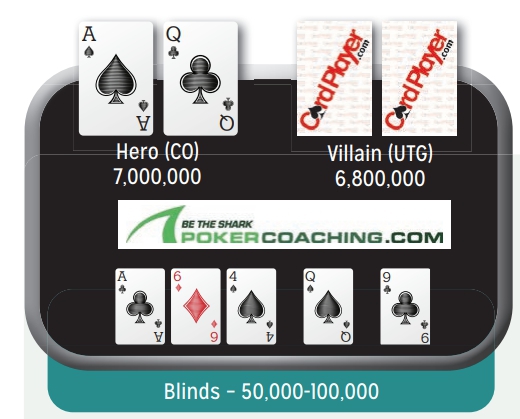






Poker Coaching Quiz: Getting Value From Top Pairby Card Player News Team | Published: May 11, 2022 |
|
|
Join more than 120,000 players worldwide who have taken their game to the next level. To develop your poker skills and learn how to crush games, check out PokerCoaching.com.
Key Concept: Getting Value From Top Pair

You are six-handed in a $1,000 buy-in tournament. You have 7,000,000 in chips and the blinds are at 50,000-100,000 when the under-the-gun player raises to 200,000. The hijack calls and it folds to you in the cutoff holding A Q
Q .
.
Question 1: Should you fold, call, reraise to 600,000, or reraise to 900,000?
Answer: There are two reasonable plays, calling or re-raising for 900,000. With strong but non-premium high card hands like A-Q, you want to force opponents out of the pot or at the least make it heads-up. Reraising small to 600,000 gives your opponents excellent pot odds to stay in, which fails to discourage calls and often results in a multi-way pot.
That said, with decently strong hands like A-Q offsuit that I do not want to have to fold to a four-bet, I often call when I think the UTG player’s range is strong and instead three-bet slightly weaker hands like A-J offsuit and K-Q offsuit as my bluffs, assuming I even want to have preflop bluffs.
You elect to call and it goes three ways to the flop. The flop comes A 6
6 4
4 and both opponents check.
and both opponents check.
Question 2: Should you check, bet 300,000, bet 600,000, or bet 900,000?
Answer: After both opponents check the flop, it is highly likely you have the best hand. While it is brutal when you bet and get check-raised, it is unlikely that will happen on this board where you have lots of sets and two pairs. Betting for a small size entices your opponents to call with hands that are drawing thin and helps build the pot for bigger bets on the turn and river.
You bet 300,000 and only the UTG player calls. The turn is the Q and your opponent checks.
and your opponent checks.
Question 3: Should you check, bet 500,000, bet 1,000,000, or bet 1,500,000?
Answer: By check-calling the flop, your opponent is pretty clearly representing an ace, six, four, or underpair. If your opponent has an underpair, do you think they would call any reasonable bet on this turn? Probably not, making it imperative that you focus on extracting value from the worse top pairs.
Betting for 1,500,000 is probably too much as it could induce folds from hands like A-2 suited or K-K. Betting 1,000,000, while slightly less, is more apt to get called by a wider range of hands you beat. While you certainly want to get as many chips in as possible, it is important to acknowledge your opponent’s range when determining your bet size.
You bet 1,000,000 and your opponent calls. The river is the 9 and your opponent checks.
and your opponent checks.
Question 4: Should you check, bet 1,200,000, bet 2,400,000, or go all-in?
Answer: Again, you should ask yourself which hands you are trying to get called by. Most underpairs will fold to any bet, so your main concern should be extracting value from worse aces. It is doubtful your opponent will find a hero call if you shove, making 1,200,000 or 2,400,000 your best options. If your opponent in fact has an ace, they will usually find a call when faced with a 2,400,000 bet, making it the ideal amount.
You bet 2,400,000 and your opponent folds pocket kings face-up.
For access to more than 1,200 interactive poker hand quizzes just like this, but in video format, visit PokerCoaching today.
Features
Tournaments
Strategy
Commentary & Analysis